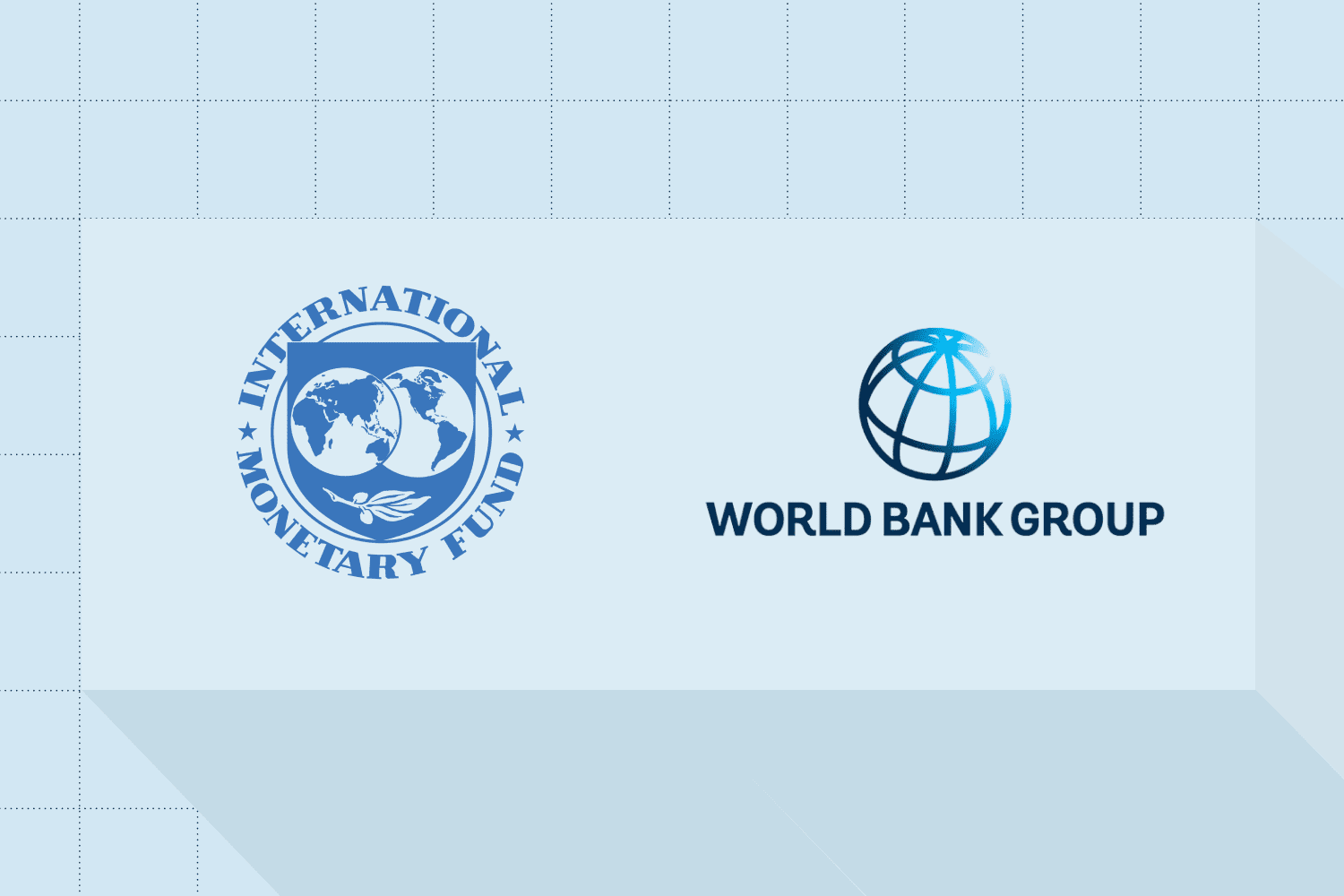This past week, policymakers gathered for the 2023 Spring Meetings of the World Bank Group (WBG) and the International Monetary Fund (IMF) to discuss a troubling forecast. Kristalina Georgieva, the fund’s managing director, warned that the global economy would expand at an average annual rate of about 3% over the next half-decade—the lowest medium-term prospects since 1990.
However, this prediction comes as no surprise considering the unending flurry of dire economic predictions foreseeing growing fragmentation and rising geopolitical tensions (i.e., Russia-Ukraine War, OPEC+ cutbacks, etc.).
Discussions centered on combating a myriad of global economic concerns, ranging from addressing growth outlooks, improving financial stability, and reducing poverty. What emerged from the conversations were four major areas of concern: inflation, trade fragmentation, emerging market debt, and climate change.
Using the AlphaSense platform, we dug into how these themes defined the WBG and IMF meetings, and how corporations are already discussing these matters internally and beyond.
The Four Main Themes
While hundreds of discussions sparked over the six-day conference in Washington D.C. last week, a few themes remained prevalent as corporate leaders shared strategies for tackling issues plaguing the global economy. Below, we share the drivers behind these issues, and how they’ll affect markets in the short- and long-term.
Inflation: When the Federal Reserve dramatically hiked up interest rates in an effort to curb inflation, the plan backfired for banks like SVB that had invested all its clients’ funds into long-dated government bonds. Rapidly rising interest rates led to a reduction in bond value, and when clients began withdrawing their money at a fast clip due to widespread panic, the bank could not raise enough capital in time and was forced to shut down. This cautionary tale shows the potential danger of using rapidly rising interest rates to curb inflation. Yet, Gieorgieva—IMF’s managing director—advises banks to stay the course to revive, as raising interest rates is key to curbing inflation and rejuvenating growth for the long term.
Trade Fragmentation: Russia’s invasion of Ukraine and growing tensions between the U.S. and China have brought unprecedented complications to global supply chains. Essential commodities, exported from both Russia and Ukraine, that many sectors rely on are no longer guaranteed. Suppliers are now forced to reconsider how they can acquire the supplies they need to meet their end users’ demands. As the strain on materials continues to grow, the monetary deficit brought on by this shortage will inevitably induce a financial crisis not only for Ukraine and Russia but manufacturers and distributors worldwide.
Similarly, China’s potential seizure of TSMC’s Taiwan semiconductor-manufacturing factories by Jingpin would hurt the US military’s access to warfare firearms, but more importantly, impact global technological leadership. For instance, if the foundries were to avoid any damage or destruction from a Chinese invasion, industry experts believe Xi Jinping would restrict the exporting of TSMC’s chips to a vast majority of global suppliers, further disrupting supply chains that were affected by COVID-19.
Emerging Market Debt: Roughly 15% of low-income countries are already in debt distress and another 45% are vulnerable. Addressing these matters entails structural changes that will speed up debt restructuring, including everything from debt standstills to sharing World Bank-I.M.F. debt sustainability analysis with all creditor nations simultaneously. But some fear that Beijing, a big lender to developing countries, could exploit their woes to widen its influence—behavior that Washington views as predatory.
Climate Change: Policymakers, academics, and development experts want the World Bank to do more to help poorer countries cope with global warming. Already, a slew of nations are embracing, or are being forced to adopt energy transitions. The global energy crisis as well as oil and gas cutbacks from Ukraine and OPEC+ have curtailed nations from taking advantage of low energy prices many thought would last for years.
This combination of economic volatility, geopolitical factors, and macroeconomic events has made reaching global government and corporate net-zero targets much more challenging. Capital is available (although it’s pricier than ever), and policymakers are acting on execution and delivery. Setting the stage for a proactive 2023 and beyond, the Inflation Reduction Act (IRA), is already driving international and domestic investments in renewable resources within the US to combat climate change.
Commentary
Climate Change
“Lin Jianhai, vice-president of the IFF, who also was attending the seminar at the IMF headquarters, said addressing climate change and sustainability challenges requires both short-term actions and consistent efforts at all levels. ’We do not only need to raise the awareness of this evolving crisis, but also leverage resources from both public and private sectors, together with international financial institutions,’ Lin told China Daily on Tuesday.”
– China Daily | News
“According to the IMF, the global economic crisis may delay investments related to climate change initiatives and is expected to make economies more vulnerable to commodity prices. The United States’ economy, for example, has witnessed improvement in the unemployment rate, but the high cost of energy and other commodities is expected to continue the uncertainty.”
“Furthermore, Europe has been impacted by the geo-political crisis more adversely with the dependency of energy supply and other major commodities from Russia. In addition to the inflationary pressures and economic recovery from the pandemic, European countries have been facing additional fiscal pressure from the spending on energy security and defense budgets.”
– Lifezone Metals Limited | F4
Trade Fragmentation
“Countries must do more to avert the costly consequences of growing global trade fragmentation, and help avert a ‘second Cold War,’ the International Monetary Fund’s(IMF) managing director said Thursday. An IMF report earlier this week predicted that growing trade fragmentation resulting from events like Brexit, the US-China trade war and the Russian invasion of Ukraine, could make the global economy as much as seven percent smaller than it otherwise would have been.”
– International Business Times | News
“Our research shows that the long-term cost of trade fragmentation could be as high as 7 percent of global GDP-roughly equivalent to the combined annual output of Germany and Japan. And as a highly integrated region, Asia would be the most adversely affected by runaway fragmentation.”
– Boao Forum for Asia | Press Release
Emerging Market Debt
“In addition, the combination of higher interest rates in developed economies as well as concerns about certain emerging market debt servicing capacities [ world ] leading to investor jitters and precipitating a sell-off of debt and exits from some markets.”
– Ecobank Transnational Incorporated | 2023 Earnings Call
“Investment performance at emerging market debt manager Ashmore has been poor, and with fears that Russia’s invasion of Ukraine could cause more volatility in Emerging Markets debt markets and further outflows, the position was sold.”
“Informa shares had performed well since the pandemic lows and the valuation had risen to discount a full recovery in its events business, but we were concerned about the potential of further lockdowns in China and slowing economic growth further afield and decided to capitalise on that recent outperformance.”
– Henderson High Income PLC | Press Release
Inflation
“Amid a global slowdown, growth in sub-Saharan Africa (SSA) is expected to decelerate to 3.6 percent before rebounding to 4.2 percent in 2024 in line with a global recovery, subsiding inflation, and a winding down in monetary policy tightening, according to the latest IMF regional economic outlook for sub-Saharan Africa published today. This will be the second consecutive year that SSA records a lower rate of growth than the previous year.”
– M2 Communications | Press Release
“Uneven growth in industry loans and deposit growth, where loans and advance growth by 13% roughly and deposit has grown by only 6%, which acute the poor farm prices in the industry for the whole year. Even though reserve money has grown by 17%, which ultimately fade out due to the growth of the currency outside bank, which is around 27%. So considering all these factors, if we see the outlook, if you see — we think the challenging liquidity scenario may continue, and there is some IMF-prescribe reform, which is as to the government that may determine the overall movement part of the financial markets.”
– IDLC Finance Limited | 2023 Earnings Call
Staying Ahead of the Conversation
Having access to the most important conversations pertaining to your industry is essential to ensuring success and longevity for your business. To uncover new opportunities in overcoming market obstacles and improving the state of the global economy, it’s essential to have a market intelligence platform that informs you of emerging trends and movements across the financial and corporate world.
Discover how AlphaSense can help you stay on the leading edge by starting your free trial today.




